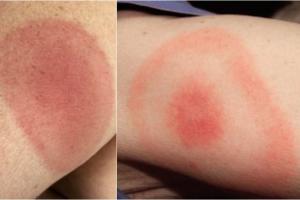Top Stories
Urgent HSE Warning: Lyme Disease Risk Surges Amid Tick Season

UPDATE: The Health Service Executive (HSE) has issued an urgent warning regarding the rising risk of Lyme disease as summer transitions to autumn in Ireland. With peak tick activity expected, officials stress the importance of recognizing symptoms to ensure timely treatment.
NEW REPORTS emphasize that Lyme disease, a bacterial infection transmitted by infected ticks, can be devastating if left untreated. The HSE highlights that while most people develop a circular red rash around a tick bite, not all infections present this symptom. This rash can manifest up to three months after a bite, but most cases show signs within the first four weeks.
Symptoms to watch for include flu-like indicators such as fever, headaches, muscle pain, and fatigue. The HSE states, “Only a small number of ticks are infected with the bacteria that cause Lyme disease.” However, if a tick bites an infected animal, the risk to humans increases significantly.
Authorities stress the critical importance of promptly removing ticks. If done within 36 hours, Lyme disease can often be prevented. The HSE recommends the following steps for safe tick removal:
– Grasp the tick as close to the skin as possible.
– Slowly pull upward, taking care not to squeeze or crush the tick.
– Dispose of it properly and clean the bite area with antiseptic.
High-risk areas for tick exposure include grassy fields, wooded regions, and sand dunes. After outdoor activities, individuals are urged to check their skin and that of their children, especially along the scalp and hairline. Don’t forget pets—ticks can hitch a ride on animals as well.
The HSE provides additional prevention tips: cover exposed skin while outdoors, use insect repellents with DEET, and stick to paths to minimize contact with tall grass and bushes. Wearing light-colored clothing can help spot ticks more easily.
If you experience symptoms such as a rash or fever after a tick bite or outdoor exposure, contact your GP immediately. Lyme disease can be challenging to diagnose due to its symptom overlap with other conditions. Blood tests may be required for confirmation, although they are not always reliable in the early stages.
Treatment typically involves antibiotics, and most individuals respond well. However, some may experience lingering symptoms like fatigue and achiness, and the reasons for this are still unclear.
The HSE concludes with a reminder: early detection and treatment are vital. Stay vigilant and protect yourself and your loved ones as tick season progresses.
For more information on Lyme disease and preventive measures, visit the HSE website. Stay safe and share this urgent update to help raise awareness!
-

 Top Stories3 months ago
Top Stories3 months agoTributes Surge for 9-Year-Old Leon Briody After Cancer Battle
-

 Entertainment4 months ago
Entertainment4 months agoAimee Osbourne Joins Family for Emotional Tribute to Ozzy
-

 Politics4 months ago
Politics4 months agoDanny Healy-Rae Considers Complaint After Altercation with Garda
-

 Top Stories4 months ago
Top Stories4 months agoIreland Enjoys Summer Heat as Hurricane Erin Approaches Atlantic
-

 World5 months ago
World5 months agoHawaii Commemorates 80 Years Since Hiroshima Bombing with Ceremony
-

 Top Stories3 months ago
Top Stories3 months agoNewcastle West Woman Patricia Foley Found Safe After Urgent Search
-

 Top Stories5 months ago
Top Stories5 months agoFianna Fáil TDs Urgently Consider Maire Geoghegan-Quinn for Presidency
-

 World5 months ago
World5 months agoCouple Convicted of Murdering Two-Year-Old Grandson in Wales
-

 World5 months ago
World5 months agoGaza Aid Distribution Tragedy: 20 Killed Amid Ongoing Violence
-

 World5 months ago
World5 months agoAristocrat Constance Marten and Partner Convicted of Infant Murder
-

 Top Stories4 months ago
Top Stories4 months agoClimbing Errigal: A Must-Do Summer Adventure in Donegal
-

 Top Stories4 months ago
Top Stories4 months agoHike Donegal’s Errigal Mountain NOW for Unforgettable Summer Views









